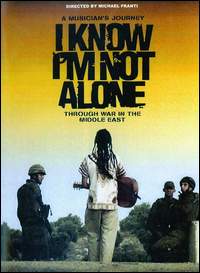| |
Taken from Maine Campus (Feb 26, 2007)
Music and the Mideast
by Thomas St. Pierre
 "Every time I see [this film] it's still just as powerful," said Diane Kay, facilitator of the Maine Peace Action Committee's showing of the documentary "I Know I'm Not Alone" last Thursday. The film, as the fourth installment to the organization's annual film series, focused on the exploits of eccentric musician Michael Franti in his 2004 journey through the heart of Baghdad, Israel and Palestine, capturing an intimate portrait of life in the extremely war-torn areas of the Middle East. The discussion that followed was different from most MPAC film dialogues. It remained noticeably quiet, as if viewers were seized by an unspoken understanding that needed no elaboration. "Every time I see [this film] it's still just as powerful," said Diane Kay, facilitator of the Maine Peace Action Committee's showing of the documentary "I Know I'm Not Alone" last Thursday. The film, as the fourth installment to the organization's annual film series, focused on the exploits of eccentric musician Michael Franti in his 2004 journey through the heart of Baghdad, Israel and Palestine, capturing an intimate portrait of life in the extremely war-torn areas of the Middle East. The discussion that followed was different from most MPAC film dialogues. It remained noticeably quiet, as if viewers were seized by an unspoken understanding that needed no elaboration.
Armed with a head full of dreadlocks, a guitar and the intent to capture the human experience of the Middle East, Franti set out to meet children, doctors, poets, restaurant owners, workers, musicians, soldiers and others. Life in the Middle East was seen firsthand - the brutal lack of medicines, the constant fright, the intense need for electricity and the burning desire for peace.
Franti witnessed an overwhelming resentment toward the United States, which - as those in the film claimed - promised liberation but replaced it instead with occupation. "This is the new freedom," one man cynically said, referring to the bitter sense of mistrust and rising crime rates. Another man spoke against occupation, saying, "We only need our people and our community to live in peace."
Franti's journey adopted a humanist perspective that unveiled the commonalities between Middle Easterners and Americans. As one Iraqi woman noted, "Your boys and daughters are going to be killed in Iraq. Our boys and girls are going to be killed in Iraq."
Indeed, Franti did not address politics and war and made no cultural distinctions between Americans and Middle Easterners - he merely saw humanity.
However, since he was unable to communicate with Middle Easterners, Franti relied heavily on two taxi cab drivers to translate and also, quite beautifully, his music. Franti achieved an intriguing understanding using the universality of music, which transcended language barriers. One composition, consisting of one word, "habibi," [meaning close friend] constantly attracted flocks of smiling children.
The discussion that followed the film attracted minimal participation. As one person commented, Franti "lets people see the human cost of war" and the powerlessness of people. As Kay herself stated, the audience is actually "going into communities and people's homes and talking," and, fundamentally, "sharing personal experience."
The movie follows individual acts of disobedience from soldiers refusing to engage in unethical militarism. While the soldiers paid dearly for their defiance, they nonetheless followed their consciences and retained their honor.
|
|